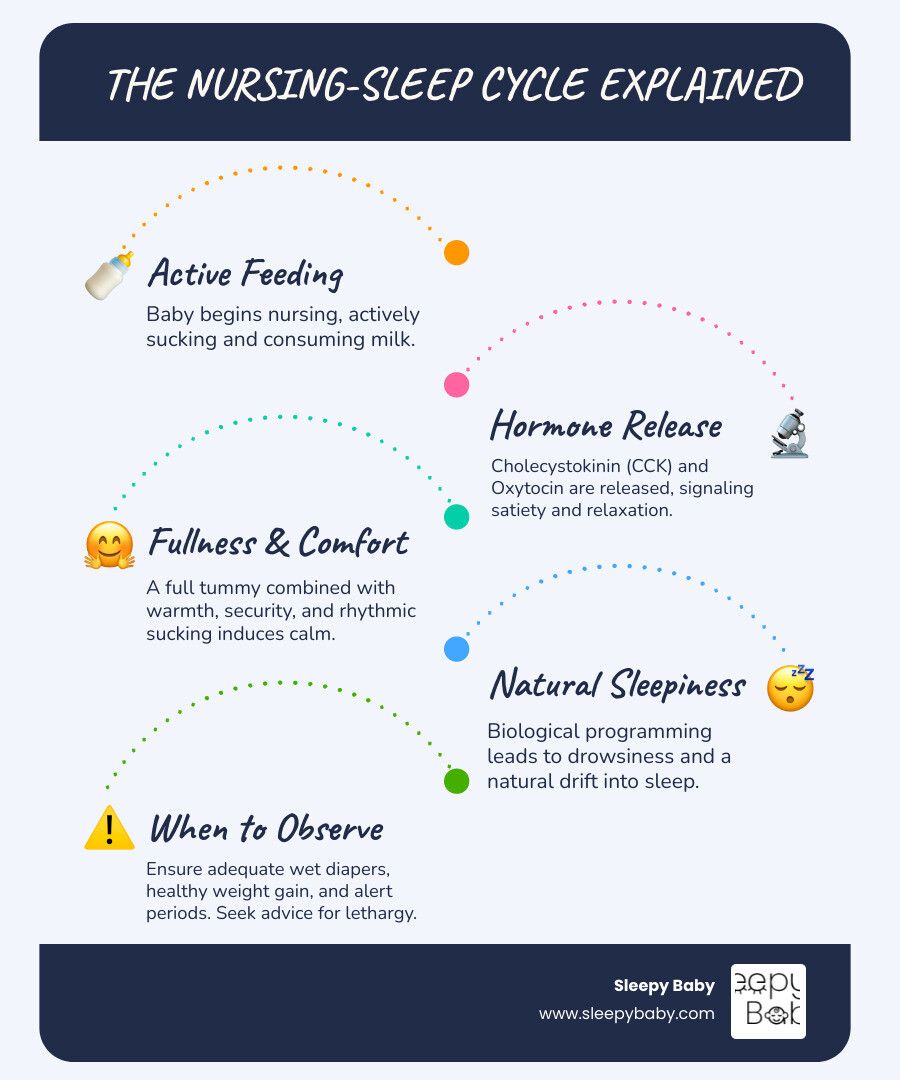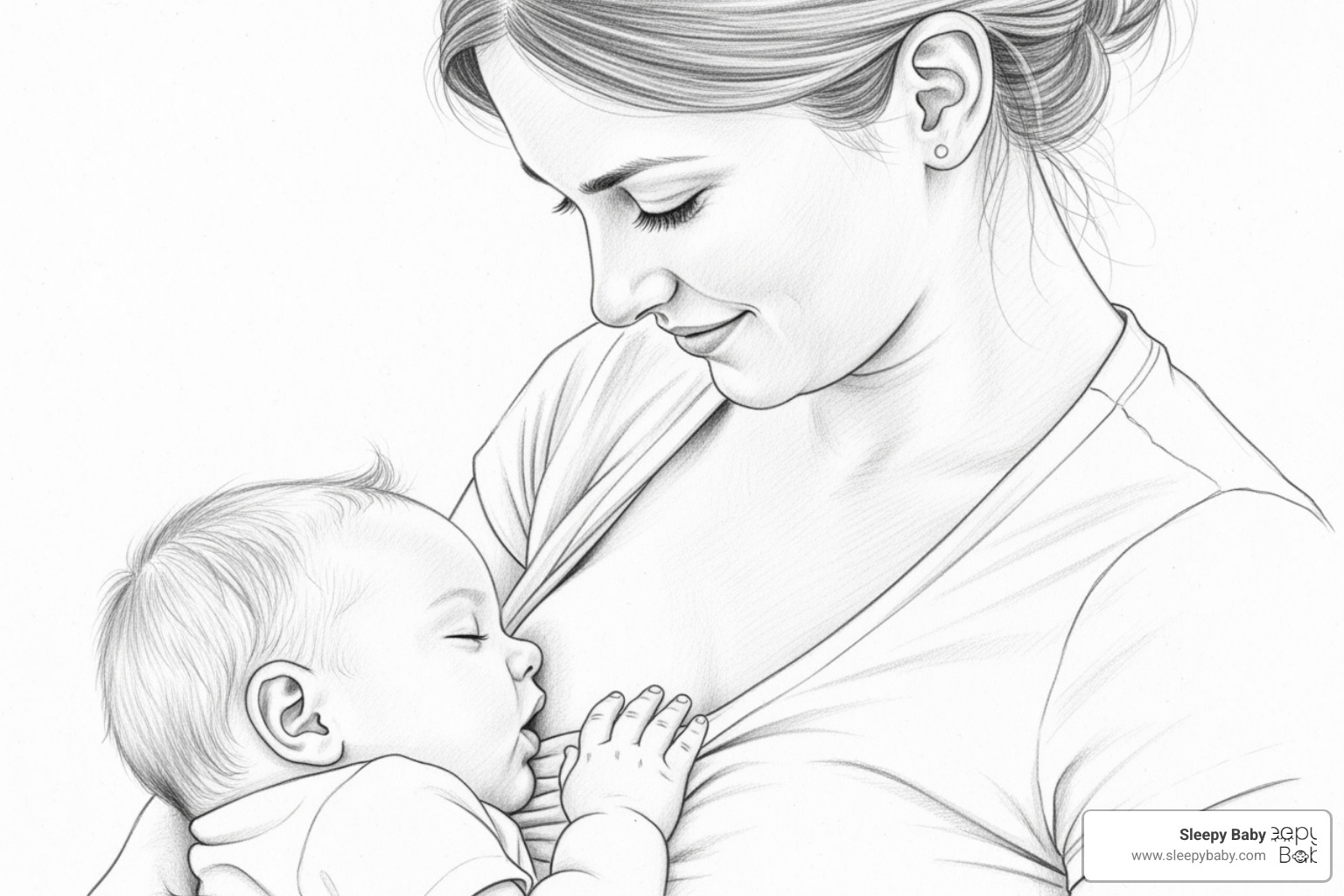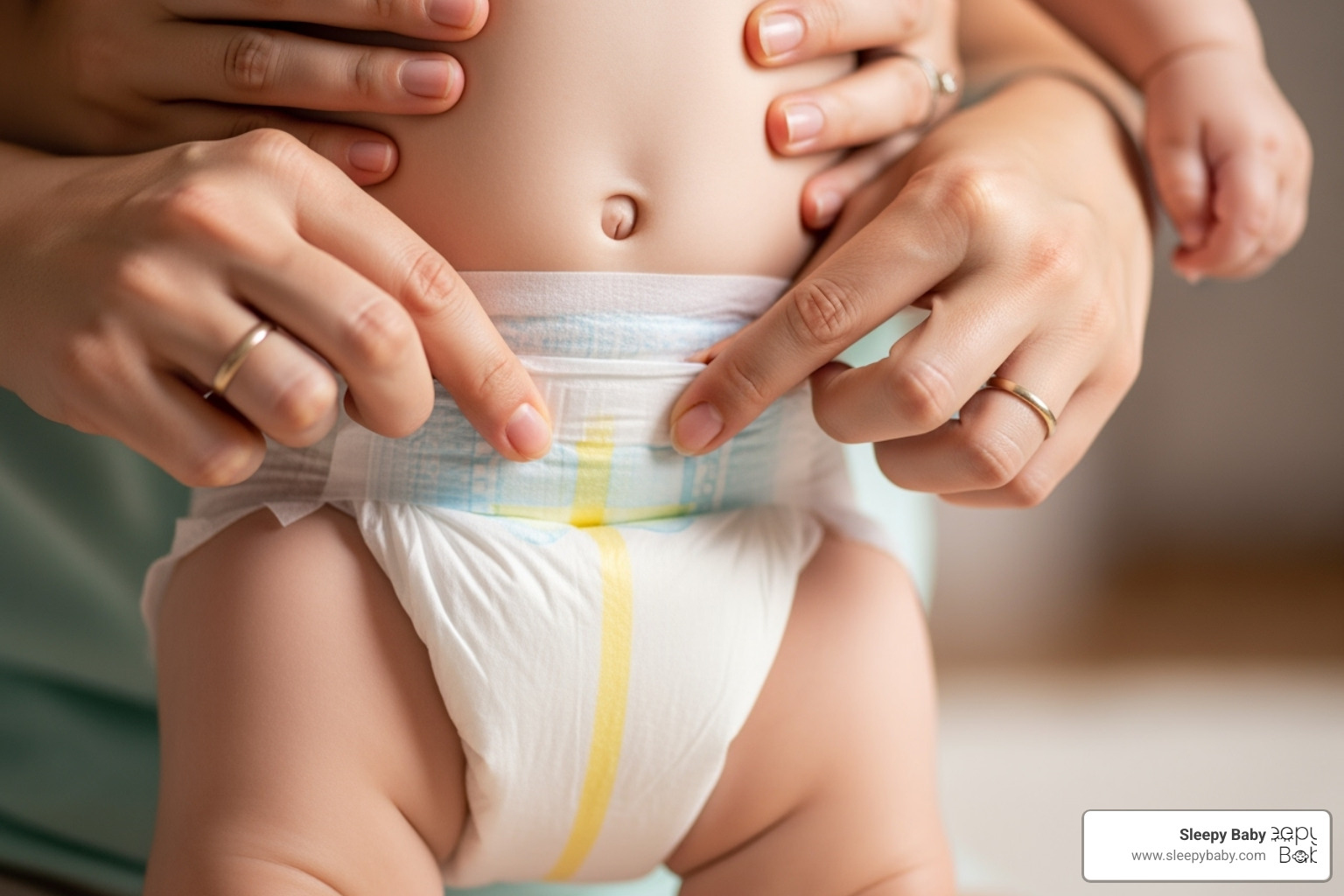
















When a baby falls asleep while nursing, it's one of the most common experiences new parents face, and it's completely normal. This natural behavior is due to hormones released during feeding, the comfort of being close to you, and a baby's biological programming to feel sleepy after eating.
Why babies fall asleep while nursing:
When to be concerned:
How to encourage full feeds:
Most newborns sleep 16-18 hours daily and often doze during or after feeds. One parent shared their frustration: "He never stayed awake long enough to get what he needed, so as soon as I put him down he'd be up within five minutes wanting more." This is a common challenge.
I'm Gary Harutyunyan, and my own struggles with my newborn's sleep led me to develop solutions that help families establish healthier sleep patterns while honoring the natural bonding that happens during feeding.

If you've noticed your baby's eyelids drooping minutes after they start nursing, you're not alone. When a baby falls asleep while nursing, it's not a sign of laziness; it's a response to powerful hormonal influences and the incredible comfort of being close to you. Nature designed nursing to be a complete sensory experience that promotes sleep, bonding, and security.
The main reason for drowsy nursing sessions is a hormone called cholecystokinin (CCK). Released during suckling, CCK acts as both a satiety signal and a natural sleep aid. It's your baby's internal messenger saying, "I'm full and sleepy." Newborns have higher levels of CCK, which is why those early weeks involve so many sleepy feeds.
CCK doesn't work alone. Oxytocin, the "love hormone," is also released during nursing. For you, it helps with milk let-down; for your baby, it promotes deep relaxation and security, making it hard to stay awake.

This biological programming creates natural sedation, where your baby's body is designed to become sleepy during and after feeding. While prolactin helps you produce milk, your baby gets a cocktail of sleep-promoting hormones. It's a perfectly orchestrated process. For additional information about how feeding cues work in newborns, you can explore scientific research on feeding cues.
Beyond hormones, the physical experience of nursing creates the perfect environment for sleep by mimicking the womb. The warmth of your body, your familiar heartbeat sound, and gentle skin-to-skin contact recreate the safe feeling your baby knew before birth. The rhythmic sucking motion is also incredibly soothing.
Nursing is also a tool for emotional regulation. When your baby is overwhelmed or tired, they may nurse for comfort, not just hunger, engaging in non-nutritive sucking for its soothing benefits. This closeness helps your baby learn to associate your comfort with feeling safe and relaxed, a crucial foundation for emotional development. For more insights into how babies develop these important skills, check out more info about self-soothing.
While it's normal for a baby falls asleep while nursing, excessive sleepiness can sometimes signal a problem. The key is to distinguish between a content, well-fed baby and one who may be struggling. While most sleepy feeders are just relaxed, it's important to know the warning signs.
Even if your baby dozes off mid-feed, their body provides clear signs that they are thriving. Look for these indicators:

If a baby falls asleep while nursing constantly and seems unusually lethargic, it could point to a medical issue. While uncommon, it's good to be aware of these possibilities:
Trust your parental instincts. If your baby seems unusually difficult to wake or something feels wrong, contact your pediatrician or a lactation consultant.
If your baby gets sleepy mid-feed before you think they've had a full meal, there are gentle ways to encourage them to stay awake. Start by watching for early feeding cues, like rooting or bringing hands to their mouth, and ensure a proper latch. A shallow latch can tire a baby out quickly because the milk flow is slower.

When your baby starts to doze off, try these gentle techniques to rouse them:
If a baby falls asleep while nursing becomes a persistent pattern affecting weight gain, it's time to investigate further.
Patience is key. You'll find the right combination of techniques to help your sleepy feeder get a full meal while still enjoying the comfort of nursing.
Is nursing your baby to sleep a bad habit or a natural part of early parenthood? When your baby falls asleep while nursing, it can be a peaceful, bonding moment. The truth is, what matters is your baby's needs and your family's well-being. Sleep associations are real, but so is the comfort nursing provides in the early months.
For newborns, letting your baby falls asleep while nursing is not only okay but beneficial. During the "fourth trimester" (the first three months), your baby is adjusting to life outside the womb. Nursing to sleep offers comfort, security, and warmth, meeting their fundamental need for safety. It's a powerful bonding experience that releases oxytocin for both of you.
If nursing to sleep works for your family—your baby is gaining weight and everyone is content—there's no need to change. However, as babies grow (around 4-6 months), some families find that nursing becomes the only way their baby can fall asleep. This can lead to short naps and frequent night wakings. This isn't a "bad habit," but a sign that sleep needs are evolving. For more perspective, you can explore more info on the nursing to sleep debate.
If nursing to sleep is no longer working for you, it's possible to help your baby learn to fall asleep independently. The goal is to add new sleep skills, not eliminate comfort.
This transition requires patience. You're helping your baby learn a new skill, which takes time and understanding.
Navigating infant feeding and sleep can be confusing, especially when your baby falls asleep while nursing. Here are answers to some of the most common questions parents have.
Not always. A truly full baby will sleep contentedly, with a relaxed body and open hands. If they wake up fussy and hungry after 20-30 minutes, they probably didn't get a full feed. Look for signs of active feeding before they doze off, like deep, rhythmic swallowing, rather than light, fluttery sucking. If your baby is producing enough wet diapers and gaining weight, you can be confident they are getting enough, even if they fall asleep.
It depends on the baby. Some swallow more air than others and need to be burped to avoid discomfort. Try burping them mid-feed when you switch sides or when their sucking slows. If they're already fast asleep, you can hold them upright against your shoulder for 10-15 minutes. The gentle pressure may release a burp without waking them. Don't worry if a burp doesn't come; not every baby needs to burp after every feed.
For newborns, nursing to sleep is normal and beneficial. As babies get older, it can become a strong sleep association, meaning they may need the breast to fall back asleep every time they wake at night, even if they aren't hungry. This can lead to frequent night wakings and parental sleep deprivation. It can also make it difficult for other caregivers to put the baby to sleep.
However, this is only a "problem" if it stops working for your family. If you decide to encourage more independent sleep, the transition can be gentle. Our rhythmic patting devices can be very helpful, providing the tactile comfort babies need to fall asleep without the breast. Paired with safe white noise at appropriate decibel levels, these tools create a soothing environment that supports the development of independent sleep skills.
When your baby falls asleep while nursing, it's rarely a cause for concern. This behavior is one of nature's most beautiful designs—a symphony of hormones, comfort, and love that helps your baby thrive. They are responding to biological signals that tell them they are safe, fed, and secure.
Remember to focus on the true indicators of success: adequate wet diapers, steady weight gain, and alert periods when they are awake. If these are on track, you can feel confident that your sleepy nurser is a content baby.
Always trust your parental instincts. If something feels off, don't hesitate to contact your pediatrician or a lactation consultant. Be flexible in your approach; what works for your family is the right choice, and it's okay for that to change as your baby grows.
At Sleepy Baby, we understand the challenges of infant sleep. Our intelligent sleep aids are designed to support you, offering rhythmic patting that mimics your comforting touch and safe white noise at appropriate decibel levels. These tools can help your baby develop independent sleep skills when you feel the time is right.
The bond you create during nursing sessions is foundational. Whether your baby dozes off or stays awake for a full feed, you're doing an incredible job.
Explore our blog for more newborn sleep solutions and let us help you create peaceful sleep for your whole family.